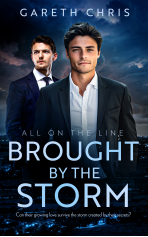“This storm could have a catastrophic impact,” the radio station’s meteorologist warned for what seemed the hundredth time today. “People should take appropriate precautions. There will be power outages from downed trees, extensive property damage from wind and flooding and possible loss of life. It’s shaping up to be the storm of the century.”
Although the forecasters had been watching the hurricane for over a week, it had only been in the last couple of days they had started betting on a Northeastern track that would bring New England’s worst disaster in decades. I should have stocked up supplies when the storm’s path was becoming clearer, but long days at work had me procrastinating. Now, with one day before impact, I was waiting in a line of cars just to enter the grocery store parking lot. It would be a miracle if there were still non-perishable items and supplies available.
After gaining lot access and driving around it more than a dozen times, I spotted a car backing from its spot. I eyed a woman in an over-sized SUV approaching from the other direction, beginning to speed up to claim the space. I pulled up to the exiting car just enough to allow them room to leave, then started nosing my Audi in just as the female competitor tried to do the same. I beat her by about two feet, and she gave me the finger and leaned on her horn. When she saw I wasn’t backing out, she did so, then sped down the lane in a huff. Once I had gotten parked, my body was tense to the point of aching.
Someone was exiting the store and abandoning a shopping cart just as I approached the entrance. Since no other carts were in sight, I grabbed it, knowing I would need more than I could carry in my hands. I maneuvered through the store’s crowd, securing items without checking prices or searching for favored brands. Every grab felt like a victory.
Although non-perishables were preferred, since I had invested in an all-house generator a year earlier, I took the chance of purchasing milk, eggs and butter as well. The deli counter wasn’t as crowded as other parts of the store, and I guessed it was because many other people didn’t have functioning appliances during a power outage. I stood behind a man who I thought would, like me, order large quantities of meats. Instead, I heard him ordering deli sandwiches. Armageddon was upon us, and he was ordering lunch? He was out of place—wearing a nice tailored suit and speaking with an unfamiliar European-sounding accent. It made me wonder if he had been transported from another country without means of communication, oblivious to the fact that he’d be starving the next day if he didn’t stock up.
As if to satisfy my curiosity, a heavyset man who had been standing nearby approached the guy in front of me and through his conversation, began to make sense of the situation.
“Mr. Howard, I’m going to need to leave you and your companions here. I can’t drive you to Newark Airport at this point. I just checked the news on my phone and reports are indicating flights are already canceled because of wind and rain conditions,” the man informed him. “The roads are becoming too dangerous for me to drive you the rest of the way to New Jersey.”
The handsome man in front of me turned to look at the driver, concern and annoyance on his face. “That won’t do,” the irritated man protested. “My mother, assistant and I must return to my country today. It is of the utmost importance.”
The driver shook his head. “Sorry. I told you it was a gamble when we started this trek. The cards didn’t play out. The storm is accelerating, and I’m not risking my life to get you there. Even if we made it, there’s a good chance that your flight will be canceled. And how am I supposed to drive back to my family in Massachusetts at that point? The storm will be strengthening and conditions will continue to deteriorate northward.”
“I’ll pay you double,” the foreigner offered, panic in his voice.
“Mr. Howard, it isn’t about money. It’s about safety—mine and yours. I’m sorry, but I’m heading back to Boston while I still have a chance of getting there. If you want to return with me, you’re welcome. Otherwise, I’ll make sure the agency credits you. You should try to find a hotel here in Connecticut to shelter during the storm. I’d pick one away from the shore to avoid flood zones.”
Mr. Howard sighed, running a hand over his face. “Please. It is imperative that I return to my country today.”
The driver shrugged. “I left your luggage with your assistant in front of the store,” he said before leaving for the exit. Mr. Howard looked crestfallen, not even hearing the deli manager call for him to take the sandwiches that he’d made.
“Um, excuse me,” I ventured. “I’m sorry. I wasn’t trying to eavesdrop, but I heard everything since you’re right in front of me. Do you need a ride to a hotel?” I had never offered to chauffeur strangers in my car, but the situation seemed to warrant an exception. Though it wasn’t rational, his attractiveness lowered my apprehension. I had heard enough to doubt the guy was a murderer—someone who’d be killing people while traveling with his mother.
Mr. Howard looked at me as if just realizing there were other people in the store. I thought my offer would elicit a small smile, but he glowered instead. “I don’t have a hotel. Is this how Americans treat others? He was compensated to take us to Newark, and he abandons us in the middle of Connecticut? If it were worth my while, I’d file a complaint with his firm.”
“I understand,” I offered. “Under other circumstances, it would be a dick move on his part.”
“A dick what?” he asked. “I’m not familiar. Is that a crass American way of saying inappropriate?”
Well, okay then. I regretted my offer, but refused to provide him additional reasons to sully my fellow countrymen by losing my cool. “Um, sorry for being crass. Perhaps you should retrieve your order so the rest of us can place ours? Good luck with your travels.”
His face softened with a hint of embarrassment. He nodded, grabbed his sandwiches and exited the line. I approached the deli case and ordered a plethora of meat, knowing there would be enough to last me several days, even if my friend Mateo came to weather the storm with me. After loading the cart, I made my way to what appeared to be the shortest cashier line, which was about fifteen customers deep. Mr. Howard was a couple of people in front of me, being dramatic with sighs and eye-rolls every few minutes. An older woman next to him, whom I assumed was his mother, patted his arm. At one point, he turned to survey the length of the line, and he spotted me behind him. I saw him whisper to his companion, and she looked over to me as well. I wondered if he had told her I was a crass American and she wanted a better view of what one looked like. Instead, she smiled at me, touched his arm once more then walked around the couple behind her to speak with me.
“Hello. I’m Mrs. Howard. My son told me about your gracious offer,” she informed me. Unlike her son, she was warm, if a bit formal. She had an air of elegance, like her son, with her refined accent, tailored clothes and a fashionable hairstyle that I doubted she managed on her own. “I just wanted to thank you. He told me he neglected to do so, and I wouldn’t want you to think we’re ungrateful.”
“Oh, it’s fine. I hope he didn’t think I was rude,” I said, wondering why I was feeling apologetic. I had always been too eager to please. “I think I may have used language to describe your driver that was…salty.” I internally chastised myself for speaking like a pirate, and wondered if she would think I was an idiot—another positive impression of Americans for this family from wherever.
She laughed. “Oh please, I’m sure my son was thinking the same salty thing.” Then she whispered, “He becomes quite testy when he’s stressed.”
I smiled, liking her. “Yes, I saw that,” I acknowledged. “But I understand. So, did you guys find a hotel to stay at?”
She furrowed her brow. “No. My son has been checking whilst waiting in line and, so far, everything seems to be booked. I’m afraid we’ll have to find a place of lodging and plead for a chair or sofa to sleep on, even if it’s in the lobby. Although on the way here, we heard a radio announcer speak of places of education sheltering people during the emergency. By chance, is there one of those within walking distance?”
I was horrified to think of this older woman walking miles to a school in the pouring rain and wind, then sleeping on a gym mat. While it was a terrible situation for anyone, from the looks of her, I was certain she had never experienced something that primitive. I suspected her son hadn’t either, though I might have enjoyed watching him try. “I don’t think any are within walking distance,” I stated.
Mrs. Howard frowned. “Oh. We’ll have to get a cab then. Perhaps you know the address of a school that we can provide to the driver?”
An internal voice was urging me to give her the name and address of the local elementary school, but another voice was guilting me to refrain. It wasn’t as if taxis would venture out in this storm to transport them anyway. “You shouldn’t stay at a school. I don’t think you realize how much you’ll be roughing it,” I explained. “When I was a kid, my family had to stay at one during an ice storm. You had to wash in group showers, eat food provided by local charities and sleep on the floor with dozens of people lying around you. It was tough for me when I was young. I can’t even imagine…”
“How an old dame like me would survive it?” she finished, but smiling to show she wasn’t offended.
“No. Not old,” I clarified.
“It’s quite all right,” she soothed, as she and I inched closer to the cash register to keep pace with the moving line. “I’m sure you’re correct. It does sound unpleasant. I don’t like the sound of a group shower. However, young man, I’ve lived through worse. Desperate times call for desperate measures, and all that.”
“Look, it might seem audacious of me, but you guys can stay at my house until the storm passes,” I blurted. I didn’t know if it was a wise statement, but I felt relieved I had said it. Now, if they refused, I could go home without guilt. If they said yes, at least the mother seemed nice. I’d ignore the son. I still had no idea who the assistant was.
“Oh, that is very kind of you,” she replied. “But you must have your own family to care for, and we wouldn’t want to intrude.”
I had one more chance to latch onto her words and bow out. I didn’t. “No. No family. Just me. I have a three-bedroom, two-bathroom house and there’s a couch that can be slept on, too. It would be more comfortable than a school.”
She looked appreciative, but also skeptical. “Why would you make such a generous offer to strangers?”
I shrugged. “Desperate times, and all that,” I answered, mirroring her earlier comment. “I promise I’m not a psychopath. I’ve never invited people I don’t know into my home. However, I can’t in good conscience let you stay at a school. It will be just a night or two anyway. I have a whole-house generator, and now I should have enough food. I guess it will help me sleep better knowing I didn’t turn you away.”
Mrs. Howard smiled. “Americans are so giving. I, like you, wouldn’t choose to cohabit with strangers, but my instincts tell me you’re a nice man. And we were ready to share space with strangers in a school, and I would think that’s far riskier. Are you sure you don’t mind?”
I nodded. “Sure.”
She surprised me once again, pulling me into a hug. “You are a dear boy. We’ll compensate you, of course.”
I waved a hand through the air. “It’s not necessary. Consider it Connecticut hospitality.”
Mrs. Howard grinned and rubbed my arm, thanking me once again. I glanced toward her son, who looked dumbfounded by the sight of us. His expression turned grim. It made me wonder if I should have listened to the first voice in my head that told me to leave them to their own devices.













 Facebook
Facebook Twitter
Twitter